
"You're All I Need to Get By" is a song recorded by the American R&B/soul duo Marvin Gaye and Tammi Terrell and released on Motown Records' Tamla label in 1968. It was the basis for the 1995 single "I'll Be There for You/You're All I Need to Get By" from Method Man and Mary J. Blige.

"Since I Don't Have You" is a song written and composed by Jackie Taylor, James Beaumont, Janet Vogel, Joseph Rock, Joe Verscharen, Lennie Martin, and Wally Lester. It was first a 1958 hit single for the doo-wop group the Skyliners on the Billboard Hot 100. Country music singer Ronnie Milsap had a hit with the song in 1991. American hard rock band Guns N' Roses also had some success in 1994 with their version of the song which reached the top 10 on the UK Singles Chart.
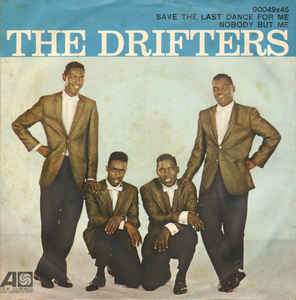
"Save the Last Dance for Me" is a song written by Doc Pomus and Mort Shuman, first recorded in 1960 by American musical group the Drifters with Ben E. King on lead vocals. It has since been covered by several artists, including Dalida, the DeFranco Family, Emmylou Harris, Dolly Parton, and Michael Bublé.

"Breaking Up Is Hard to Do" is a song recorded by Neil Sedaka, co-written by Sedaka and Howard Greenfield. Sedaka recorded this song twice, in 1962 and 1975, in two significantly different arrangements, and it is considered to be his signature song. Between 1970 and 1975, it was a top-40 hit three separate times for three separate artists: Lenny Welch, The Partridge Family and Sedaka's second version. The song was also adapted into multiple languages, most notably in Italian and French.
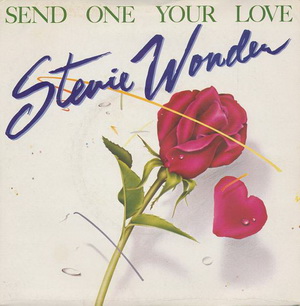
"Send One Your Love" is a 1979 soul single by American and Motown musician and singer Stevie Wonder from his album Stevie Wonder's Journey Through "The Secret Life of Plants" (1979). Released in November 1979 as the album's lead single, the song reached number four on the US Billboard pop singles chart in 1979 The song also became Wonder's second single to top the adult contemporary chart, following 1973's "You Are the Sunshine of My Life", topping the chart for four weeks. On the soul charts, "Send One Your Love" went to number five.

"Let It Be Me" is a 1960 single by The Everly Brothers. The song is an English-language cover of "Je t'appartiens", which had been released as a single in France by Gilbert Bécaud in 1955. The song was a top ten hit for The Everly Brothers in the United States and spawned many additional cover versions.
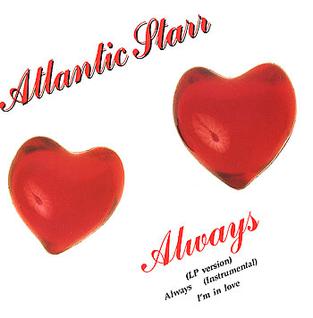
"Always" is a song by American R&B group Atlantic Starr. The track was the second single from the group's seventh studio album All in the Name of Love (1987). The single was the biggest hit for Atlantic Starr; it peaked at number one on both the US Billboard Hot 100 and Billboard Hot Black Singles charts in June 1987, being the band's only number one song. The song also spent two weeks atop the U.S. adult contemporary chart. In July, it topped the Canadian RPM 100 national singles chart, where it remained for two weeks. The British Phonographic Industry (BPI) certified it silver.

"Yes, I'm Ready" is a song by Barbara Mason from her album Yes, I'm Ready (1965). It has been covered by numerous artists, and was a hit single for Teri DeSario and K.C. when they recorded a duet version in 1980.

"The Woman in Me" is a song by American singer Donna Summer, released as the third and final single from her eponymous tenth studio album (1982). The song reached number 33 on the Billboard Hot 100, number 30 on the Black Singles chart, and number 17 on the Adult Contemporary chart in early 1983. It was written by John Bettis of Carpenters fame.
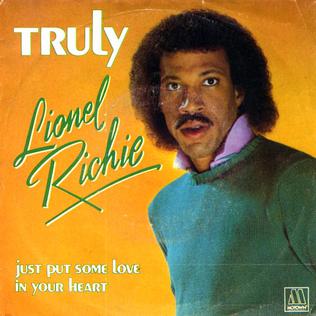
"Truly" is the debut solo single by American singer-songwriter Lionel Richie. Resuming where he left off with D-flat major tunes "Sail On" and particularly "Still" when he was lead for the Commodores, Richie wrote the song and co-produced it with James Anthony Carmichael.

"Tin Man" is a 1974 song by the pop rock band America. It was written by band member Dewey Bunnell and produced by George Martin, who also plays the piano part on the recorded version. The song was included on the band's album Holiday, also from 1974.

"Love Ballad" is a song by R&B/Funk band L.T.D. Jeffrey Osborne is the lead singer.

"Cupid" is a song by American singer Sam Cooke, released on May 16, 1961. It charted at number 17 on the Billboard Hot 100 and number 20 on the Hot R&B Sides chart; the track performed best in the United Kingdom, peaking at number seven on the UK Singles Chart. The song is featured on Cooke's greatest hits album, The Best of Sam Cooke (1962). Cooke's producers had asked him to write a song for a girl they had seen on a Perry Como TV show—but once they heard her sing, they kept "Cupid" for Cooke himself.

"All This Love" is a single by DeBarge, released on October 17, 1982. The song was released as the third and final single from their second studio album of the same title on the Gordy label. The single would help DeBarge rise to R&B stardom. A cover version of the song was recorded by Patti LaBelle on her 1994 gold album Gems. A video for her version was also filmed.

"He Will Break Your Heart", is a song originally performed and co-written by Jerry Butler. It was a top-ten hit in 1960.
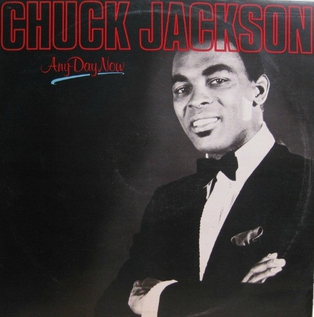
"Any Day Now" is a popular song written by Burt Bacharach and Bob Hilliard in 1962. It has been recorded by numerous artists over the years, including notable versions by Chuck Jackson in 1962, Alan Price in 1965, Elvis Presley in 1969, Scott Walker in 1973 and Ronnie Milsap in 1982. In the lyrics, the singer predicts the imminent demise of a romantic relationship and describes the sadness this will leave.

"Broken Hearted Me" is a song written by Randy Goodrum, originally recorded by England Dan & John Ford Coley for their album Dr. Heckle and Mr. Jive, and later covered by Canadian country and pop music singer Anne Murray. It was released in September 1979 as the first single from her album I'll Always Love You. The song reached No. 1 on the Billboard Hot Country Singles chart in December, Murray's fourth No. 1 single on that chart. She also recorded a version of the song in Spanish, which was released on vinyl, and later on CD.

"Everybody Plays the Fool" is a 1972 song first recorded by American R&B group The Main Ingredient, and written by J. R. Bailey, Rudy Clark and Ken Williams. It was the first single released from the group's album Bitter Sweet, released with the B-side "Who Can I Turn To ". "Everybody Plays the Fool" was the group's highest charting hit single, reaching No. 3 on the Billboard Hot 100 chart in the fall of 1972. It also peaked at No. 2 on the Billboard R&B chart and at No. 25 on the Billboard adult contemporary chart. It was certified gold by the RIAA.

"What You Won't Do for Love" is a song by American singer-songwriter Bobby Caldwell. It was released in September 1978 as the lead single from his eponymous debut album (1978). It was written by Caldwell and Alfons Kettner, and produced by Ann Holloway. The song has been covered and sampled numerous times, including by Tupac Shakur in the posthumous 1998 hit "Do for Love".

"Foolish Pride" is a single from singer/songwriter Daryl Hall. It was the second single release from his second solo album, Three Hearts in the Happy Ending Machine.




















